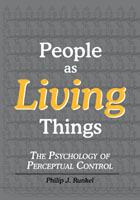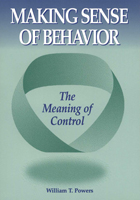| Home about PCT Presentation Order | |
|
Bruce GregoryOn People as Living Things: Our ability to make sense of the physical world would be greatly diminished without the ability to formulate mathematical models that make prediction possible. The social sciences have long been hampered by the absence of such models. As Phil Runkel lucidly demonstrates, we are on the threshold of a new era in psychology and sociology. In the absence of quantitative models, psychological theories are little more than just-so stories. On the other hand, closed-loop negative-feedback models for the first time provide a firm basis for building a quantitative science of human behavior. Runkel demonstrates how such models are constructed and reviews what has been learned by applying them to understanding human beings and their interactions. For anyone who wants to understand and to benefit from the emerging quantitative science of behavior, Phil Runkel’s People as Living Things is a superb place to start.
On Making Sense of Behavior: (posted at Amazon.com) Bill Powers in virtually unknown outside a very small community of people interested in applying control theory to understanding human behavior, an activity that can be traced backed to Norbert Wiener's influential work in the 1940's. Powers' obscurity is particularly unfortunate because his work is truly revolutionary and deserves a much wider audience. In this book he gives a typically lucid presentation of the basics of his application of control theory to understanding everyday behavior. It's a wonderfully clear exposition of his ideas and provides invaluable insights into what makes us tick. Perhaps in the next millenium academic psychology will catch up to Powers. Until this happens, you couldn't ask for a better guide than this engaging book. _________________________________________________________ Bruce Gregory currently serves as Senior Science Educator at the Harvard-Smithsonian Center for Astrophysics Science Education Department http://cfa-www.harvard.edu/sed/. In 1988, when he served as Associate Director, he authored Inventing Reality - Physics as Language (Pdf-file, 450 kB). This book illustrates scientific revolutions, thus supplementing Thomas Kuhn's The Structure of Scientific Revolutions. Bruce Gregory's work is mentioned in Why study perceptual control theory (Pdf-file, 55 kB).
|
|
| © 2004–2024 Living Control Systems Publishing |
|


